
The initial training program for students admitted to the School of Mechanical Engineering:
| Tên chương trình: Name of program: | Kỹ thuật Cơ khí Mechanical Engineering | Kỹ thuật Cơ điện tử Mechatronics Engineering | Kỹ thuật ô tô Automative Engineering | Kỹ thuật Cơ khí động lực Transport Mechanical Engineering |
| Trình độ đào tạo: Education level: | Cử nhân Bachelor | Cử nhân Bachelor | Cử nhân Bachelor | Cử nhân Bachelor |
| Ngành đào tạo: Major: | Kỹ thuật Cơ khí Mechanical Engineering | Kỹ thuật Cơ điện tử Mechatronics Engineering | Kỹ thuật ô tô Automative Engineering | Kỹ thuật Cơ khí động lực Transport Mechanical Engineering |
| Thời gian đào tạo: Duration: | 4 năm 4 years | 4 năm 4 years | 4 năm 4 years | 4 năm 4 years
|
| Bằng tốt nghiệp: Degree | Cử nhân Kỹ thuật Cơ khí Bachelor in Mechanical Engineering | Cử nhân Kỹ thuật Cơ điện tử Bachelor in Mechatronics Engineering | Cử nhân Kỹ thuật Ô tô Bachelor in Automative Engineering | Cử nhân Kỹ thuật Cơ khí động lực Bachelor in Transport Mechanical Engineering |
The curriculum of the Mechanical Engineering (ME) training program is integrally designed with 5 majors and 163 credits [ME.03.03.01]. It is designed in a way that students can acquire knowledge and skills from low to higher level. Specifically, B1 is a general knowledge block that provides learners with general knowledge and teaches them the required attitude and the quality of engineers. B2 is a professional knowledge block at the bachelor level that provides learners with core knowledge and skills in the field, E1 is a professional knowledge block at the engineering level that provides learners with specialized knowledge, E2 comprises an internship and engineer graduation project. The curriculum structure is illustrated in Appendix A2 and schematized in folowing Figure:
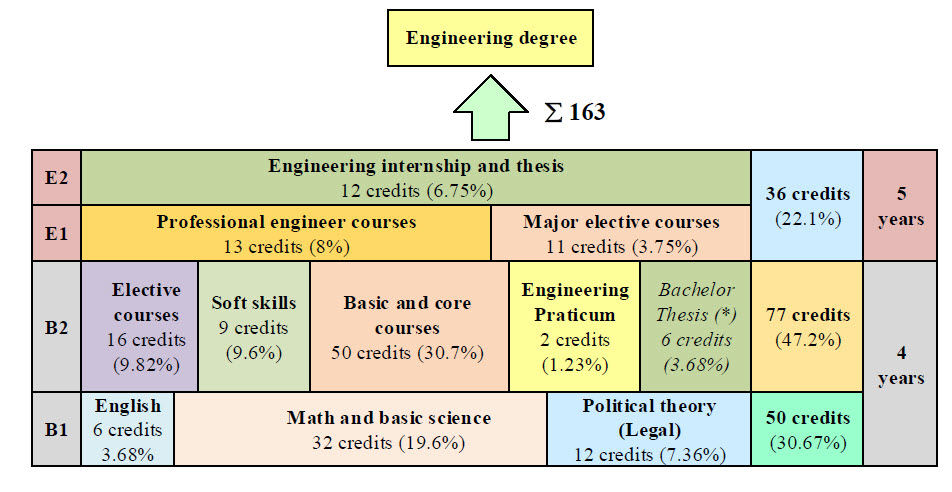
The curriculum structure of ME training program
1. Mechanical Engineering Bachelor’s Program
The Mechanical Engineering group has 05 fields of application:
The content of the training program is shown in the following diagram:
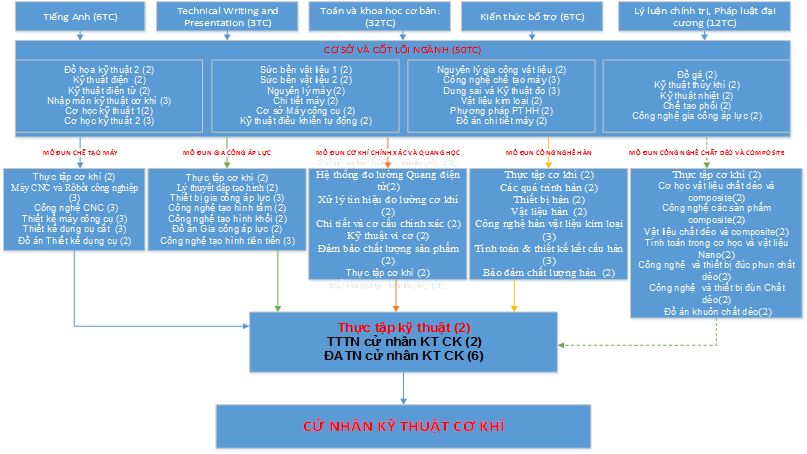
Mechanical Engineering Bachelor’s Program
The enrollment quota and admission number of recent years are described as following:

Enrollment quota and admission scores for ME program
The development of output standards from which to adjust the training program so that it is close to these requirements is a very important task of the School and the University in recent years. Learners who are interested in the output standards, as well as the training programs of the systems, can refer to the details below.
Output Standards and Training programs (Click the link to view):
Detailed training program (Click the link to view):
2. Bachelor of Mechatronics Engineering
The Mechatronics Engineering group has 04 fields of application:
The content of the training program is shown in the following diagram:
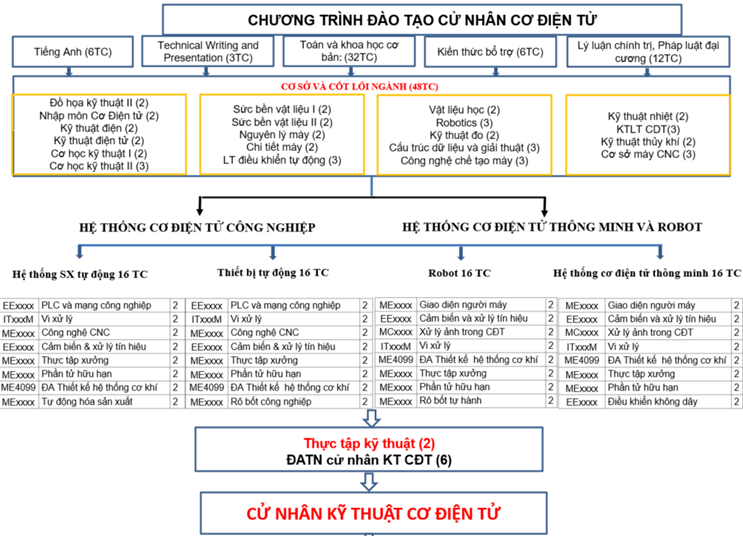
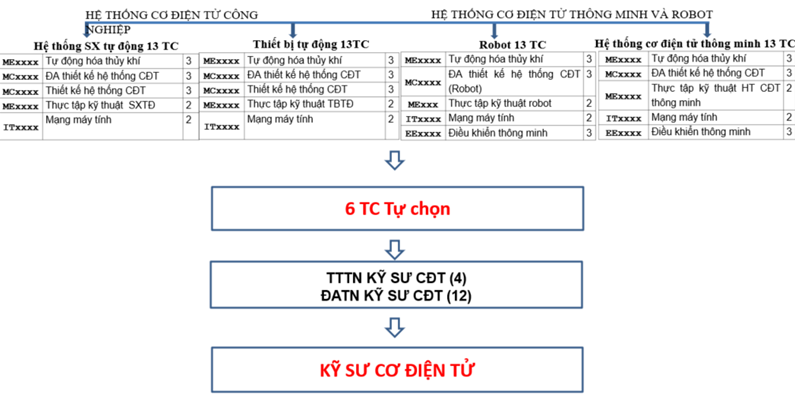
Mechatronics Engineering Bachelor’s Program
Output Standards and Training programs (Click the link to view):
Detailed training program (Click the link to view):
3. Bachelor of Automative Engineering
The Automotive Engineering program includes 47 credits of foundation and core courses, grounded in basic mechanical engineering theory and fundamental automotive engineering knowledge (such as general automotive structure and power sources in vehicles), along with extensive practical assignments. Learners are equipped to apply this core industry knowledge and utilize modern methods and tools to design and evaluate solutions for systems, processes, and products in mechanical engineering in general, and automotive engineering applications in particular.
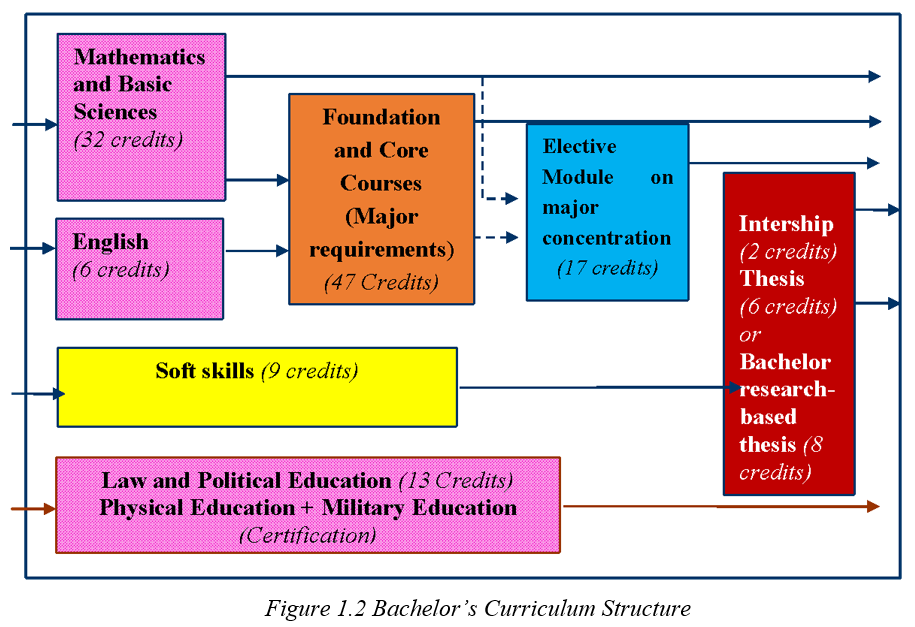
Detailed training program (Click the link to view):
4. Bachelor in Transport Mechanical Engineering
The undergraduate programme in Transport Mechanical Engineering (TME) is one of five undergraduate programmes at Department of Vehicle and Energy Conversion Engineering (VECE), School of Mechanical Engineering (SME). The TME programme has been developed since 2007 and applied since 2009. General information about the TME training programme is shown in table below.
| Education level: | Bachelor |
| Major: | Transport Mechanical Engineering |
| Training Code: | 7520116 |
| Duration: | 4 years |
| Degree: | Bachelor in Transport Mechanical Engineering |
| Credits in total: | 132 credits |
The TME programme is built with two specified orientational modules: Fluid Power and Automation Engineering (FPAE) module and Intelligent Water Vehicle Engineering (IWVE) module. FPAE module focuses on the problems of machines & automation systems using fluid power sources and renewable energy machines such as wind turbines, water turbines and tidal turbines,… IWVE module focuses on the problems of water vehicles and smart water vehicles such as: modern ships, offshore structures such as oil and gas rigs, autonomous systems and equipment, automation equipment controlling marine energy exploitation systems, modern ships. The TME programme provides learners with the knowledge and skills necessary to become competent experts in research, calculation, design, manufacturing and operation of fluid machines & automation, vehicles and systems in most fields of transport mechanical engineering meeting the needs of society and the country. The TME programme is designed in accordance with the form of a credit-based training system. The training model of the TME programme is based on the new university model proposed in 2020 as shown in Figure 01. The TME programme requires 4 years (8 semesters) for a bachelor degree, including 132 credits, divided into two large blocks: general education block (51 credits) and professional education block (81 credits). In professional education block, there are 46 credits for basic and core of engineering, 9 credits of soft skills, 18 credits for elective modules, 8 credits for bachelor project and including the internship. After the bachelor program, students can continue to study for a master’s or engineering degree by accumulating an additional 48 credits in one and a half years (Figure 02). All courses and study plan of the program are shown in Figure 03.
Author: admin
Reader Comments